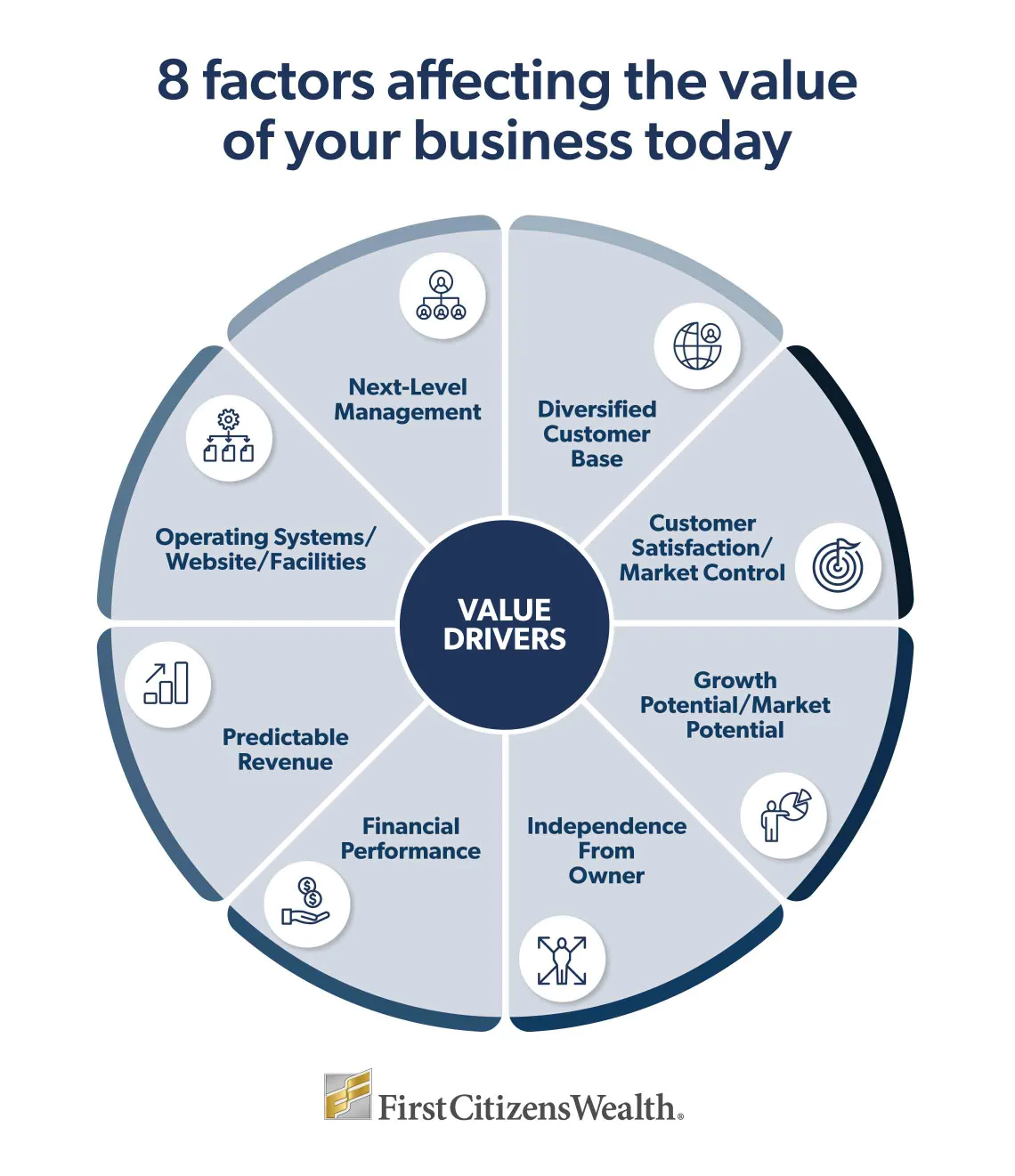8 factors affecting the value of your business today
William Coghill
Wealth Planning Strategist
Do you know what your business is currently worth? It's a simple question to ask, but arriving at an accurate answer often requires some time and effort.

Although most business owners are well-versed in managing the daily needs of their companies, we've found that fewer owners have experience in this arena because selling a business is often a once-in-a-lifetime experience. Also, in the event of a sale, business buyers often have an extensive understanding of the factors affecting business valuations, which can lead to an advantage over sellers.
The value of your business
If you need to increase the value of your company—to match your retirement needs, for instance—increasing sales might be your first instinct. However, adding salespeople or trying to generate additional revenue may ultimately drive down company value due to the stress it may cause. If you're considering the sale of your company, these eight factors may help you arrive at an equitable valuation in the short term—and enhance this valuation over the long term.

1Diversified customer and supplier bases
Examining the makeup of your current customer base can help you better understand the value of your company. Having a diverse customer base that's not comprised of a small number of large customers for the bulk of your revenue can help bolster your company's worth because your success isn't overly dependent on the needs and whims of a handful of clients.
Here's a hypothetical example to illustrate this dynamic. Acme Auto is Treadwell Tire's single biggest customer, accounting for 80% of Treadwell's annual orders. A simple 5% annual reduction in orders by Acme would constitute a 4% overall loss of yearly business to Treadwell.
If any single customer represents more than 5% of revenue, creating initiatives to diversify and expand your customer base can help you stabilize your revenue and potentially increase the value of your organization.
The same principle applies to your suppliers. Having a deep bench of suppliers can help you sidestep significant price increases from any single vendor. Developing a range of active suppliers can help you continually negotiate sharper pricing, maintain healthy margins and potentially increase your company's worth.
2Customer satisfaction and position in the market
Thoroughly understanding how you're regarded by your customers can also shed light on your company's repeat sales, overall health and value. For example, a study by Bain & Company revealed that companies who excel at customer experience grow revenue 4% to 8% above their market segment. Tracking your customer satisfaction level is a useful yardstick for potential buyers of your company should you choose to sell.
When First Citizens Wealth consultants speak to business clients, most company owners understand the importance of customer satisfaction to their long-term business health, but many haven't put a strategy in place to monitor and address customer feedback in a systematic way.
Engaging third-party and crowd-sourced review services may give your company an introductory understanding of customer satisfaction. However, more in-depth initiatives are needed to gather accurate and actionable feedback from customers. Internal initiatives—such as in-house surveys, customer experience programs and client advisory boards—can offer more of the granular feedback needed to drive growth and bolster value.
Having a dominant position in your market niche is another effective barometer of your company's value because it's manifested by higher-than-average margins, for example.
Market dominance can also be observed via the following characteristics:
- A company brand that's well-known among diverse market segments
- Long-term histories with major clients throughout your industry
- A sizable portion of customers who order repeatedly, are members of your loyalty program and respond well to upsell offers
- A robust and effective client referral program
- A unique, hard-to-replicate product or service offering that provides a protective moat from competitors
3Growth potential of the business
When studying growth potential as a sign of your company's worth, it's valuable to review both industry and company metrics. Positive sales and profit outlooks for your industry can help strengthen your company's valuation. If your company is part of a rapidly growing industry with significant economic importance, such as e-commerce or healthcare, this macro growth can have a positive impact on your individual company's worth.
Looking at promising characteristics within your organization can also translate to a higher valuation. When working with business clients, our wealth consultants typically inquire about the following growth indicators within each company:
- New lines of business and revenue generators identified with high likelihoods of success
- Growth plans developed that include completed feasibility studies, implementation steps and timelines
- Sales and growth projections in line with the business's recent sales history
- Significant barriers to entry for competitors considering entering your market
Of course, going to market with strong financials and a comprehensive growth plan can be attractive to buyers regardless of the current sentiment in your industry.
4Independence from owner
After speaking with countless business clients and prospects, we've discovered that a company's long-term value is often inversely proportional to its owner's day-to-day involvement in key decisions and operations. If an owner has delegated critical tasks and decision-making authority to capable employees, the value of the organization is no longer dependent on or based solely on a single individual, allowing it to become more robust over time.
How much owner participation is too much? To understand the true level of owner involvement in a company, ask the 3-month vacation question. If a business owner went on a 3-month vacation and was unavailable, how would their company perform during this time? It can be illuminating for owners to look at this question through multiple lenses, such as the stability of daily operations, execution of growth plans and employee morale.
Once you understand your current level of owner dependence, you can implement initiatives to decrease this reliance. Documenting all business processes and procedures can empower employees to act with much less ownership oversight. However, process and procedure documentation must be easily accessible to employees in order to be effective.
Developing a formal contingency plan is another effective strategy to encourage less owner-dependent operations. Like the processes and procedures documentation, your contingency plan should be thoroughly written, widely accessible and communicated to employees for quick enaction if the owner suddenly becomes incapacitated or unavailable.
5Financial performance
Financial performance is one of the more straightforward indicators of your company's worth, and it offers many insights for potential buyers and sellers.
Highly valued businesses typically have the following characteristics.
- Revenue and profit growth: A history of consistent and substantial year-over-year revenue growth that exceeds industry averages
- Budgeting process: The employment of a company-wide budget process where variances are examined annually by the CFO or controller
- Capital expenditure: Annual expenditures consistently lower than industry averages
- Supplier pricing: Supplier and vendor pricing that's aggressively negotiated at frequent intervals with successful outcomes
To get a complete picture of each client's business, our wealth consultants study company balance sheets, income statements, tax returns, and top- and bottom-line trends over 3- to 5-year periods. Because of their standardization, tax returns are particularly helpful when evaluating a company's value. Returns allow for comparative analysis to fully understand a company's strengths and weaknesses versus industry standards.
6Predictable revenue
The ability to successfully sell a company is reliant upon demonstrating its future growth potential. The forecast of revenue at an upward trajectory helps define market value via your company's resiliency in the market and indicate to a buyer what return they'll make on their investment.
Our wealth planners use three characteristics to analyze revenue predictability:
- A high percentage of revenue derived from recurring orders, such as new clients converted to long-term clients; a higher percentage of orders from existing customers can indicate a higher potential company value
- Company revenue that's not substantially impacted by economic cycles and seasonality
- A majority of company clients who are regularly engaged in long-term or multiyear contracts instead of one-time transactions; also a key ingredient in referral programs that can inexpensively drive client acquisition
7Systems, technology and facilities
When assessing the worth of your company, don't overlook its physical assets. Examining, rating—and in some cases updating—these assets in a systemized fashion can add value to your business.
Optimizing the upkeep of the following items offers an opportunity to increase worth and augment the results of your sales and marketing strategies.
- Company facilities: Examine your portfolio of office space, structures and storage to ensure adequate space is available for your current operations, as well as any future growth plans.
- Business technology: When kept current and safeguarded from cyberattacks, the breadth of your in-house and remote computer systems is an often-overlooked source of value. Up-to-date hardware, software and the latest cybersecurity can help you optimize productivity and minimize downtime and are well worth the time and expense necessary to maintain. A company website that includes the latest adaptations—such as AI capability and customer engagement analytics—is also a necessity.
- Company records: Given the potentially catastrophic consequences when lost or damaged, company records are another unsung company asset. Well-maintained, easily accessible physical and digitized records are a necessity for any business contemplating a sale.
- Balance sheet analysis: Access to a CPA—either as a full-time employee or vendor contractor—to regularly audit the company's financial statements and produce strategic financial analysis for your management team can offer substantial value.
8Next-level management presence and capabilities
Your company's next-level management can also have a significant effect on the value of your business. In this context, next-level management refers to high-performing, experienced leaders working under the owner. Their impact on a company's worth is primarily dependent on the level of empowerment given to them by the owner.
Second to empowerment, the diversity of your next-level management team is a critical component. We've found that many leaders at high-value businesses have risen through the ranks of the organization.
The following strategies can be employed to develop a deep bench of capable next-level managers.
- Develop formal employee training and tuition reimbursement programs that are available to all employees so you can discover and cultivate management candidates within the organization.
- Implement incentive programs tied to the company's long-term growth and success that are vested over time so employees are encouraged to stay with the business longer.
- Empower the management team to develop and communicate the business's strategic vision to foster a genuine sense of ownership in its success.
In addition to an owner succession program, a formal succession program for your management team can help you maintain your organization's leadership capabilities and ensure your team's stability through transitions if you lost any key members of your management team.
The bottom line
As an owner, making sense of the obvious—and not-so-obvious—drivers of your company's value can be a daunting task. After working closely with business clients for decades, we've developed the necessary tools and resources to help you prepare your business for a potential buyer—in the near or distant future.
Our team of dedicated and experienced professionals can help identify, measure and enrich the elements that drive the worth of vibrant companies. To learn more about the range of factors that affect the value of your business, speak to a First Citizens Wealth consultant today.





